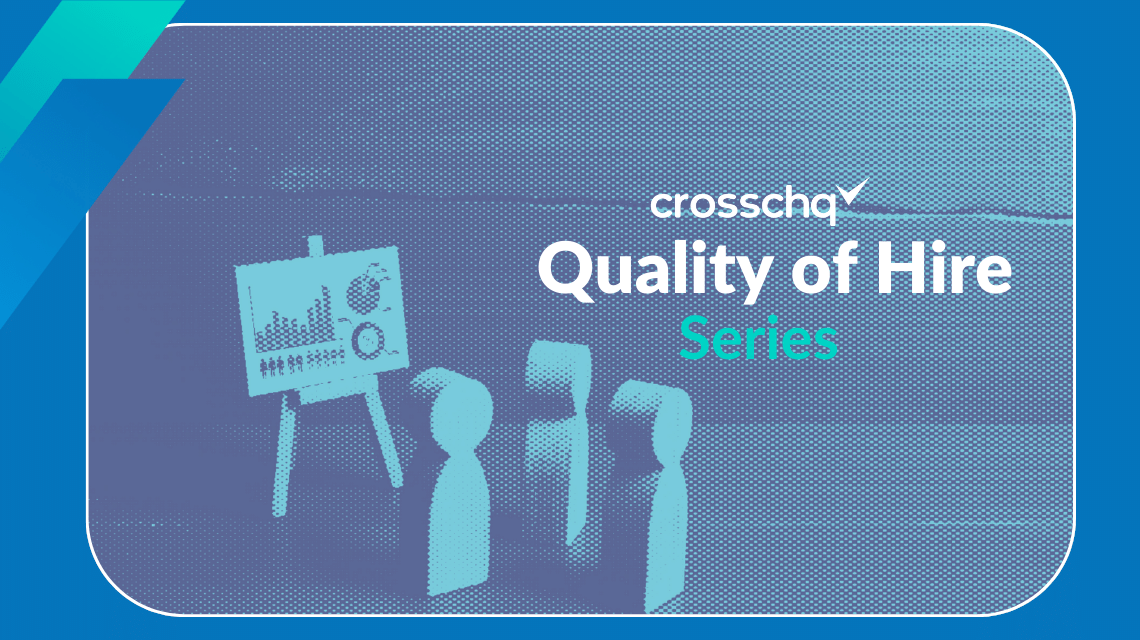

Crosschq Blog
Background Check: A Complete Guide

Background checks have been around for 40 years, providing hiring managers, nonprofits, and organizations valuable information on the histories and experiences of prospective candidates. Today, background checks are standard practice for most hiring teams, especially for public-sector positions through the state and federal government.
Below is everything you need to know about background checks and how to leverage them in your hiring process.
What is a background check?
A background check is a verification process that aims to verify the identity, work history, criminal history, education, and other activities in an individual’s past. Background checks are most common in government positions, financial roles, healthcare, education, IT and tech roles, and security roles.
Background checks can be conducted by third-party companies, schools, landlords, and government agencies, like the FBI. They provide insight into everything from work history and criminal background, to financial status and educational achievements. Here’s everything a background check might include:
- Credit score
- Criminal background
- Employment history
- Salary
- International activity
- Personal background check
- Universal background check
- OIG background check
- License and certificate verification
- Driver’s history
- Social security verification
Purpose of background checks
Background checks serve a number of purposes for hiring teams and organizations as a whole. For one, they can help verify information on a resume that a candidate shares through the interview. Things like work history, certifications, and education level are all things you can ensure through a background check.
Second, background checks help keep you and your employees safer and more legally compliant. Especially for positions that require individuals to work closely with vulnerable people–like teachers, healthcare professionals, or financial roles–you need to ensure your candidates don’t pose a risk.
As long as you comply with the Fair Credit Reporting Act, you can use background checks to ensure new candidates don’t threaten your employees, customers, and organization.
What to look for in a background check
Unlike reference checks, background checks can’t illustrate an employee’s skill set, personal achievements, emotional intelligence, or other work-related skills. What it can do, and what you should look for in a background check, is:
- Candidates are who they say they are: From their legal identity to their education level and certifications, background checks can help you verify important information about candidates' professional and personal backgrounds.
- Criminal records: Most criminal background checks will include current pending charges, misdemeanor convictions, felony convictions, acquitted charges, and dismissed charges. If you hire someone with a history of fraud or identity theft for a finance position and something goes wrong, you could face a negligent hiring lawsuit. Background checks keep your community safer and ensure due diligence from your hiring team.
- Previous employment verification: Before you get into the nuts and bolts of your reference check, you can verify whether or not a candidate has actually worked at a location they claim to have worked at.
Background check vs. reference check
Sometimes used interchangeably, background and reference checks serve two different purposes. Although both are important, background checks are used to verify recorded experiences, legal titles, financial information, and other concrete records available to public and third-party agencies.
Reference checks, on the other hand, can be used to assess a wide range of skills and experiences pertaining to an individual’s efficacy in the workplace. Reference checks, which can now be automated and streamlined through 360 digital references, can provide you with insight into a candidate’s:
- Soft skills
- Work experience
- Educational experience
- Emotional intelligence
- Leadership skills
- Teamwork capabilities
- Communication style and skill set
- Culture fit
- Quality of hire score
- Strengths and weaknesses
When to use a reference check instead of a background check
The simple answer is to leverage both background checks and reference checks. Depending on your state, you might encounter some legal limitations on how you conduct background checks in the hiring process.
However, in most cases, the best time to run a background check is at the end of the hiring process (usually following the interview). The background check can help you verify all of the information and data you’ve been given by the candidate, allowing you to make a final decision and identify any pre-hire liabilities.
Reference checks, on the other hand, should be conducted at the beginning of the hiring process. They can help you confirm information candidates share on their resumes, and they’ll provide you with key experiences from references that you can integrate into your interview.
360 Reference Checks with Crosschq
Gone are the days of tedious, manual reference checks that may take weeks and leave you with unanswered questions. Crosschq’s 360 digital reference checks are 95% faster than traditional reference checks. Our automated solution is fast and easy to use, providing key insights and new talent pools you can build over time from references.
Request a demo to leverage Crosschq’s cutting-edge reference check solution and identify quality hires today.
Take the Guesswork
Out of Hiring
Schedule a demo now



%20-200x43.png)





